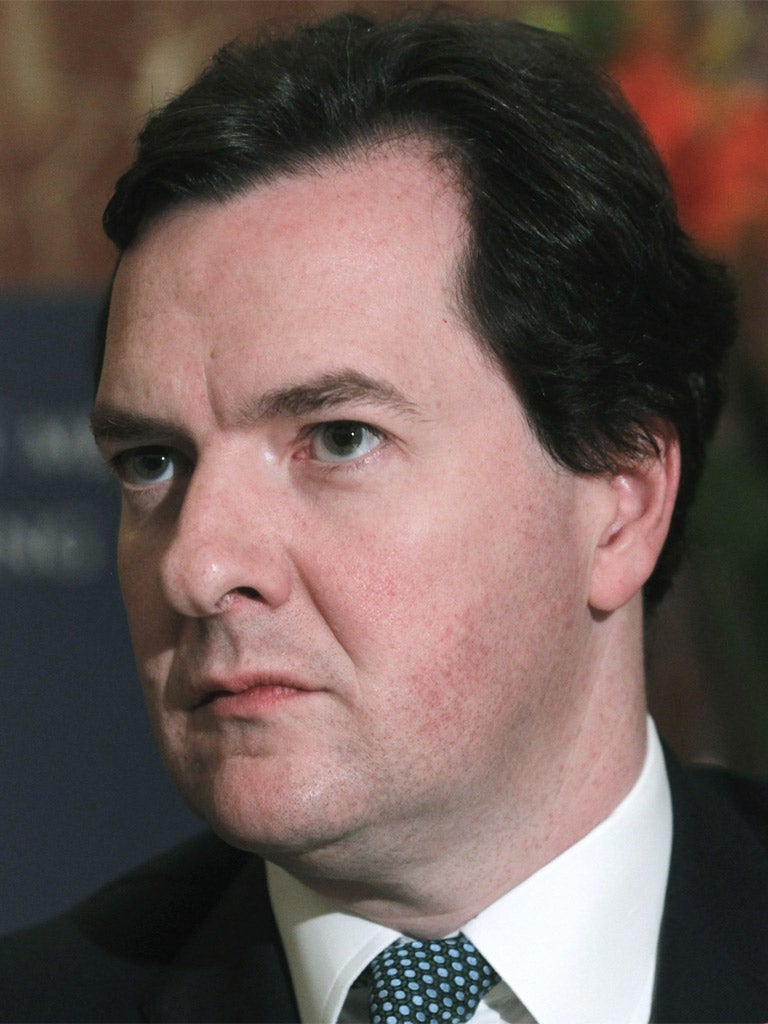Osborne's £700m bonus for the banks
Chancellor faces massive shortfall on anticipated revenue from levy on banks' balance sheets

Your support helps us to tell the story
From reproductive rights to climate change to Big Tech, The Independent is on the ground when the story is developing. Whether it's investigating the financials of Elon Musk's pro-Trump PAC or producing our latest documentary, 'The A Word', which shines a light on the American women fighting for reproductive rights, we know how important it is to parse out the facts from the messaging.
At such a critical moment in US history, we need reporters on the ground. Your donation allows us to keep sending journalists to speak to both sides of the story.
The Independent is trusted by Americans across the entire political spectrum. And unlike many other quality news outlets, we choose not to lock Americans out of our reporting and analysis with paywalls. We believe quality journalism should be available to everyone, paid for by those who can afford it.
Your support makes all the difference.The Government's levy on the banks will raise only £1.8bn in the current financial year, much less than the £2.5bn figure repeatedly trumpeted by David Cameron and George Osborne.
It is the second year running that the Chancellor has fallen short of his goal for raising money from the banks. The lower-than-expected revenue from the levy on the banks' balance sheets was confirmed by the Office for Budget Responsibility (OBR), the independent fiscal watchdog, in its twice-yearly report on the economy.
Labour accused the Government of letting the banks off the hook and handing them a "double tax cut", claiming the sector would also enjoy a £200m bonus from reductions in corporation tax for all businesses. Labour said that meant the tax burden on banks would be £1.6bn in the current financial year, almost £1bn less than the Government's £2.5bn target.
The OBR said it had revised downwards the forecast revenue from the bank levy "as a result of latest receipts data and information on likely full-year liabilities". It warned that plans for greater regulation, such as banks splitting their high street and investment operations, would "constrain the growth in banks' balance sheets".
In 2011-12, the levy raised only £1.8bn and the banks received a £100m windfall in lower corporation tax. The revenue loss is embarrassing for ministers, who claim the levy ensures the banking sector makes a "fair contribution" which reflects "the risks it poses to the financial system and the wider economy".
Although Mr Osborne announced a rise in the levy in his Autumn Statement to prevent a shortfall in the future, he did not mention this year's revenue loss.
He insisted banks would not benefit from future cuts in corporation tax, which will be reduced to 21 per cent by 2014. The Treasury will launch a full assessment of why the levy is raising less than expected. Officials believe the fragility in the eurozone had an impact on balance sheets, and part of the shortfall might be due to banks moving to safer funding models because of the levy, boosting financial stability.
A Treasury aide said last night: "This Government is determined to ensure banks make a fair contribution, which is why we introduced a permanent bank levy in contrast to Labour's one-off levy. We expect the bank levy to raise at least £2.5bn each year, which is why we increased the rate this January. The increase in the bank levy rate ensures they do not benefit from the cut in corporation tax."
Ministers claim the levy will raise much more over the five-year parliament than Labour's one-off £3.5bn tax on bank bonuses. However, Labour has since called for that to be repeated to fund a job for every young person out of work for a year or more.
Chris Leslie, a Labour Treasury spokesman, said: "It tells you all you need to know about this Government that along with 8,000 millionaires, the banks are getting a tax cut while millions of working people are being forced to pay the price for this Government's economic failure." He added: "Whether it's on taxation or watering down reforms to separate retail and investment banks, David Cameron and George Osborne have repeatedly failed to stand up to the vested interests of the banks. With the Government now set to borrow £212bn more than planned, and long-term unemployment at a worryingly high level, it's time the Chancellor agreed to repeat Labour's bank bonus tax, on top of the bank levy."
Mr Cameron promised in January 2011: "The bank levy will raise £2.5bn once it is fully up and running." In November that year, he said: "It is this Government who have put in place a bank levy that will raise more every year than Labour's one-off bonus tax raised in one year."
Join our commenting forum
Join thought-provoking conversations, follow other Independent readers and see their replies
Comments